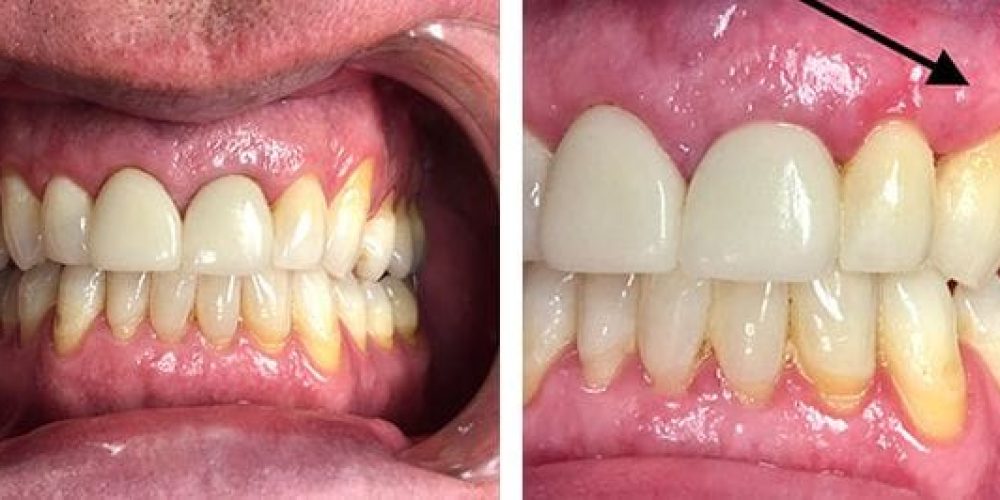Gum Surgery
- Home
- Gum Surgery
Have questions? We're here to help!

Gum Surgery
Gum health is just as important as maintaining strong teeth when it comes to oral care. While brushing, flossing, and routine dental check-ups help prevent gum issues, certain conditions may require more advanced treatments—such as gum surgery. If you have receding gums, periodontal disease, or other gum-related concerns, surgery might be the best way to restore your oral health and prevent further complications.
At Synovia Health, we specialize in advanced gum surgery techniques, helping patients regain healthy gums and a confident smile. Let’s dive deep into understanding gum surgery, why it’s needed, the types of procedures available, and what to expect before, during, and after the treatment.
What Is Gum Surgery?
Gum surgery, also known as periodontal surgery, is a dental procedure that treats and repairs damaged gum tissue caused by gum disease, infections, or injuries. It is often recommended when non-surgical treatments such as deep cleaning (scaling and root planing) or medications are no longer effective in controlling the disease.
Gum surgery can:
- Remove infection and bacteria from beneath the gums
- Reshape and restore gum tissue
- Reduce gum pockets to prevent further bacterial buildup
- Restore gum coverage over exposed tooth roots (gum grafting)
- Enhance the overall appearance of your gums and smile
Who Needs Gum Surgery?
Your dentist or periodontist may recommend gum surgery if you have:
- Gum Disease (Periodontitis) – When plaque and bacteria build up under the gum line, causing inflammation, bleeding, and deep pockets between teeth and gums.
- Gum Recession – When gums pull away from the teeth, exposing the roots and making them vulnerable to sensitivity, decay, and eventual tooth loss.
- Excess Gum Tissue (Gummy Smile) – When excessive gum tissue covers the teeth, making them appear shorter than normal.
- Loose Teeth Due to Bone Loss – When gum disease weakens the supporting bone structure, leading to loose or shifting teeth.
- Tooth Loss and Need for Dental Implants – If gums and jawbone need preparation for implant placement.
If you experience any of these conditions, consult Synovia Health for a personalized treatment plan.
Types of Gum Surgery
There are different types of gum surgery, depending on the severity of the problem and the desired outcome.
1. Gingivectomy (Gum Tissue Removal)
- Purpose: Removes excess gum tissue that causes a “gummy” smile or deep pockets that trap bacteria.
- Procedure: The dentist numbs the area and carefully trims away extra gum tissue, reshaping the gum line for a more natural look.
- Recovery: Mild discomfort for a few days; full healing in about 1-2 weeks.
2. Gum Grafting (For Receding Gums)
- Purpose: Restores lost gum tissue and covers exposed tooth roots, preventing sensitivity and decay.
- Procedure: Tissue is taken from another area (roof of the mouth or a donor source) and attached to the receding gum area.
- Recovery: Some swelling and discomfort for a week; complete healing in a few weeks.
3. Flap Surgery (Pocket Reduction Surgery)
- Purpose: Treats severe periodontal disease by cleaning deep pockets of bacteria.
- Procedure: The gums are lifted, and plaque and tartar buildup beneath them are thoroughly cleaned. The gums are then stitched back into place.
- Recovery: Slight swelling for a few days; complete healing within a few weeks.
4. Crown Lengthening Surgery
- Purpose: Exposes more of the tooth structure by reshaping both the gum and bone, often done before placing a crown or filling.
- Procedure: Excess gum and sometimes bone tissue are removed to reveal more of the natural tooth.
- Recovery: A few weeks for complete healing.
5. Laser Gum Surgery (Minimally Invasive Option)
- Purpose: A modern alternative to traditional gum surgery that uses laser technology to remove infected tissue and stimulate gum regeneration.
- Procedure: A laser is used to remove bacteria and infected tissue while promoting faster healing.
- Recovery: Minimal pain and swelling; healing is faster compared to traditional surgery.
Each procedure is tailored to the patient’s condition, ensuring the best results for gum health restoration and smile enhancement.
What to Expect Before, During, and After Gum Surgery
Before Surgery: How to Prepare
- Schedule a consultation at Synovia Health to discuss your condition and treatment plan.
- Your dentist may take X-rays and scans to assess the severity of gum disease.
- If necessary, a deep cleaning (scaling and root planing) may be performed before surgery.
- Avoid smoking and alcohol, as they can interfere with healing.
- Follow any pre-surgery instructions, such as fasting if sedation is required.
During Surgery: The Process
- The procedure is performed under local anesthesia (sometimes combined with sedation for comfort).
- Depending on the type of surgery, it may take 30 minutes to 2 hours.
- Most gum surgeries are outpatient procedures, meaning you can go home the same day
After Surgery: Recovery & Care
- Mild swelling and discomfort are normal; pain medication may be prescribed.
- Stick to soft foods (soups, yogurt, mashed potatoes) for the first few days.
- Avoid brushing the treated area for a few days; use a prescribed mouthwash instead.
- Follow-up visits are necessary to monitor healing.
- Full recovery typically takes 2-4 weeks, depending on the procedure.
Benefits of Gum Surgery
- Stops gum disease progression – Prevents further damage and tooth loss.
- Reduces gum recession – Protects exposed tooth roots.
- Improves oral hygiene – Makes it easier to clean teeth and gums.
- Enhances smile aesthetics – Creates a balanced and attractive gum line.
- Supports overall health – Reduces the risk of infections that may affect the heart and other organs.
Why Choose Synovia Health for Gum Surgery?
At Synovia Health, we provide state-of-the-art periodontal treatments with a focus on precision, comfort, and long-term success. Our experienced dental professionals use advanced technology to deliver the best possible care while ensuring a stress-free experience.
- Expert Periodontists – Skilled specialists in gum disease treatment and surgery.
- Minimally Invasive Techniques – Laser treatments for faster healing.
- Personalized Treatment Plans – Tailored to your unique dental needs.
- Affordable & Transparent Pricing – High-quality care at reasonable costs.
- Patient-Centered Approach – Compassionate care and a supportive environment.
Don’t let gum disease or receding gums affect your oral health and confidence! Schedule a consultation with Synovia Health today and take the first step toward a healthier, more beautiful smile.
